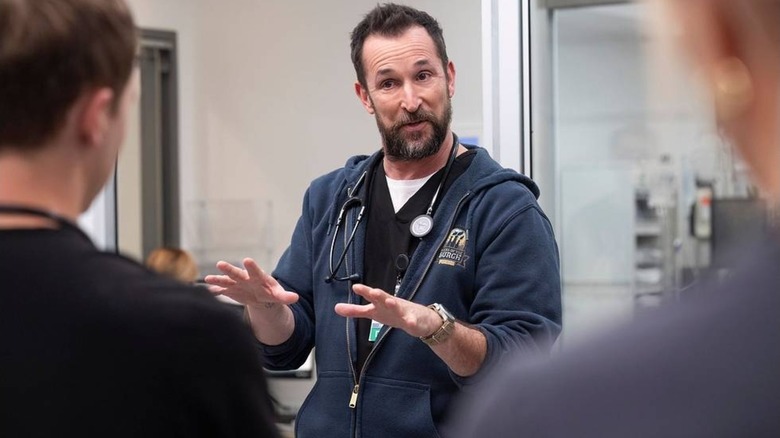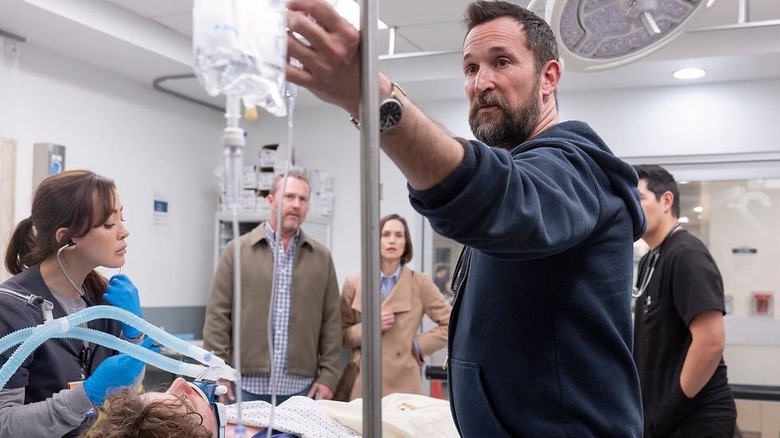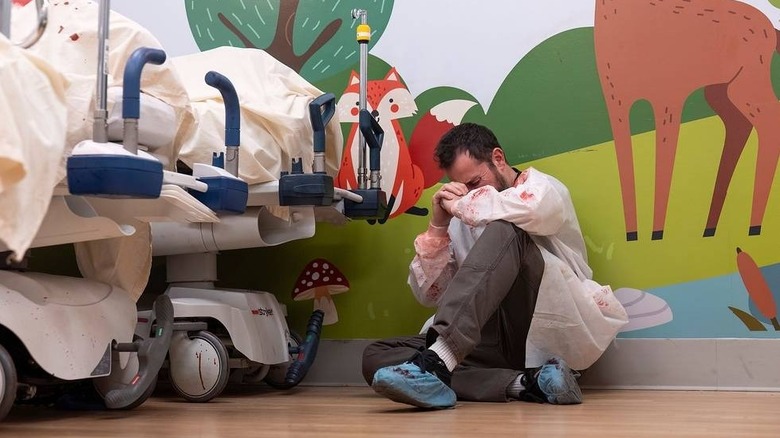HBO's The Pitt Writers Room Had One Rule That Guided The Series
The HBO Max original series "The Pitt," which was created by "ER" alums R. Scott Gemmill, John Wells, and Noah Wyle, can be a tough watch at times, and there's no way around that. With each episode taking place in "real time" in a busy ER led by trauma attending Dr. Michael "Robby" Robinavitch (Wyle), the audience sees a lot of terrible patient outcomes — and gets a front row seat to the reactions of their families. Be it a young college student who accidentally overdosed on fentanyl after taking a laced pill, a six-year-old girl who drowns saving her even younger sister, two adult children struggling to let go of their father, or a devastating mass shooting, Robby goes through it, and so do we ... and the way that Robby and his fellow physicians handle these tragedies is very specifically written by the show's creative team, as it turns out.
In an interview with The Hollywood Reporter, Joe Sachs, a writer and executive producer on the show who also worked in a real emergency room for three decades, opened up about how the series' creatives portrayed some of these gut-wrenching cases. As Sachs explained, they really rely on people with firsthand knowledge. "But when I want to really make sure things are good and right, we reach for consultants," he revealed. "The deeper you dig, the more interesting details you get that people are unaware of, and that makes for fresh storytelling.
In the case of the elderly man whose grown children aren't ready to say goodbye to him (even after they learn from Robby that his outcome is definitively bad), Sachs said that he spoke to Ira Byock, author of the book "The Four Things That Matter Most." In Byock's book, he recalled that, while working as a physician, he met a patient who asked that the doctors not treat his life-threatening aneurysm, and he watched as their family said their goodbyes.
"With the man's two daughters and wife present, I shared that other families had found value in saying four things to one another before goodbye: 'Please forgive me. I forgive you. Thank you. I love you,'" Byock told the outlet, referencing the "four things" in his book title. "It's the rare family that has perfect relationships. Usually, there's some history of misunderstandings, hurt feelings, or real transgressions. Another thing to say is, 'I'm proud to be your mom, dad, son or daughter.'"
"This is the other side of emergency medicine," Byock shared. "It is lots of blood and guts, but I told the writers to remember there are also tender moments and opportunities to help somebody heal on a much deeper level. Apparently, Noah Wyle loved that story; he did a fabulous job making it his own."
The way that the doctors of The Pitt speak to the families of their patients has led to real-life changes
Something so notable about Robby and the doctors in his orbit is the way that they strive to be as gentle as possible with their patients' families. Even with parents who arrive towards the end of season 1 and all but refuse life-saving medical care for their son, who's suffering from measles and is unvaccinated, Robby does his very best to meet them at their level — and according to Joe Sachs, he's gotten real feedback from people who received bad outcomes for their loved ones, as well as doctors who are now dealing with more informed families.
"An emergency doctor posted in a group chat on a social media site, saying, 'I was working a night shift in the ER at two in the morning, and a 92-year-old woman with a heart attack came in and was not doing well,'" Sachs shared, going on to say that the family told the doctor that they watch "The Pitt" and, after seeing the storyline about the elderly man refusing further care against the will of his children, they learned about this unfortunately common situation and chose comfort care for their loved one. "That blew my mind!" Sachs admitted. "The fact that the show gets people talking or taking real-life action is nothing I was prepared for."
THR also spoke to Dr. Shoshana Ungerleider, who founded an organization called End Well in 2017 that aims to destigmatize talking about end-of-life care in society."More accurate portrayals of serious illness and end-of-life on TV prepare audiences of all ages with a clearer idea of what really happens and what options exist beyond aggressive intervention," Dr. Ungerleider shared. She continued:
"When I worked in the hospital, I can't tell you how many times family members wanted CPR on a patient because they saw people get chest compressions on TV and pop up the next day and walk out the door. Trying to go up against the miraculous saves on every medical show was really hard. 'The Pitt' provides kind of a master class in communication that viewers and health care workers can draw upon in their own lives."
Apparently, "The Pitt" doesn't just provide representation for families of patients. Considering how medically accurate the show is, it shouldn't surprise anyone that its depiction of how physicians deal with devastating moments at work has also resonated with real-life healthcare workers.
Not only is The Pitt great at depicting patient and family care, but it also does justice by real doctors too
The most gutting thing that happens in the entire first season of "The Pitt," which is really saying something, is towards the end of the season when Robby and his fellow doctors have to help victims of a sudden mass shooting event at a local party called PittFest. To compound the horror of treating multiple gunshot wound victims, it's personal for Robby — because his surrogate son, Jake (Taj Speights), was at PittFest with his girlfriend Leah (Sloan Mannino). As it turns out, Jake is okay, but Leah was shot in the chest, and as Robby and charge nurse Dana Evans (Katherine LaNasa) desperately try to save her, she bleeds out in front of them.
To say Robby is broken by Leah's death is an understatement. After she dies, he brings Jake into the makeshift morgue — which, in a particularly gruesome touch, is the ER's pediatric wing — to show him Leah's body and, after Jake angrily asks why Robby couldn't save Leah, the good doctor says something profound and heartbreaking: "I am going to remember Leah long after you've forgotten her." Robby gets Jake out of the room moments before he suffers a panic attack, trying to grapple with the desperately tragic circumstances of his day ... and his entire career.
As far as Joe Sachs is concerned, the way "The Pitt" depicted the way gun violence affects first responders is a first for TV. "Every week you read about a mass shooting, somewhere in America, and it's 'Thoughts and prayers, okay, let's wait for the next one,'" Sachs mused. "But to actually see into an emergency department with the impact on families and individuals, I don't think has ever been done with the accuracy and the emotions that we played."
Dr. Shoshana Ungerleider agrees and thinks that showing Robby's breakdown here is vitally important. "The fact that the show doesn't shy away from showing the moral distress and grief when physicians lose patient after patient also helps people understand how healthcare workers aren't emotionally detached from death," she noted. "We have to find ways to process the grief and then move on to show up for the next patient. It's a very hard job."
"The Pitt" definitely makes it quite clear that being an ER doctor is no easy feat — which is one of many things that makes the show so phenomenal. You can stream "The Pitt" on HBO Max now, and season 2 is set to premiere in January 2026.


